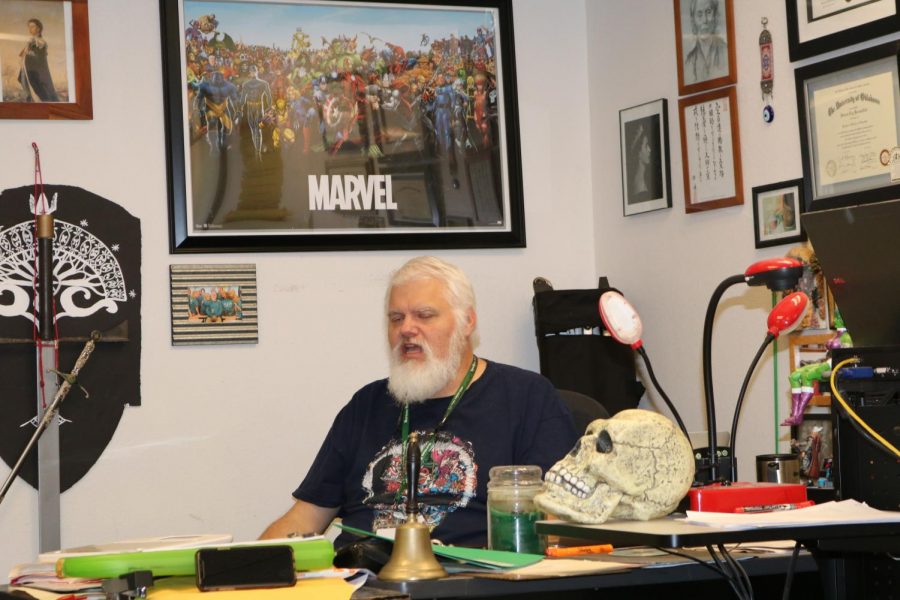The Marvel-ous Mr. Brownfield
Teacher of the Year 2020.
This week I got to sit down with Mr. Brownfield to talk about his accomplishments as a teacher. We explored various topics such as his Teacher of the Year Award, his take on improving his curriculum, and his favorite topic: superheroes.
Jackson Fish: How long have you taught at Norman North?
Steven Brownfield: 17 years.
JF: What was your motivation to become a teacher after a long college career?
SB: I very much enjoyed the academic discipline of literature itself, or English itself. That was a major factor. It sounds corny, but it’s very difficult to sound sincere about it, but it really did feel like it was a calling. Like, it was something that I was supposed to be doing.
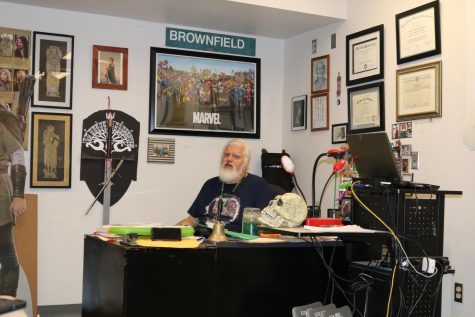
[Peter Parker] had all kinds of normal kid worries, hang ups, fears, and then of course, will Mary Jane go to the prom with me…
SB: I have, I teach an elective, I teach classical literature…the literature and culture of ancient Greece and Rome. I’ve done that for 15 of my 17 years. I used to be a sponsor of Key Club, but that was back in prehistoric days. I was the most inappropriate sponsor for Key Club. Imagine, it’s like the junior Chamber of Commerce. I have sponsored the Chess Club too, but Chess Club is like, the most informally organized club in history. Right now I’m not even sure we have one. I don’t think we do.
JF: Would you ever create a club to sponsor?
SB: No, I wouldn’t and the reason is, I think they are most useful and most beneficial to students when they are student led, student direct, and student created. I know a lot of clubs are very active where the sponsor is doing a lot of the work. They might actually get a lot accomplished, but I don’t know what good that does the students.
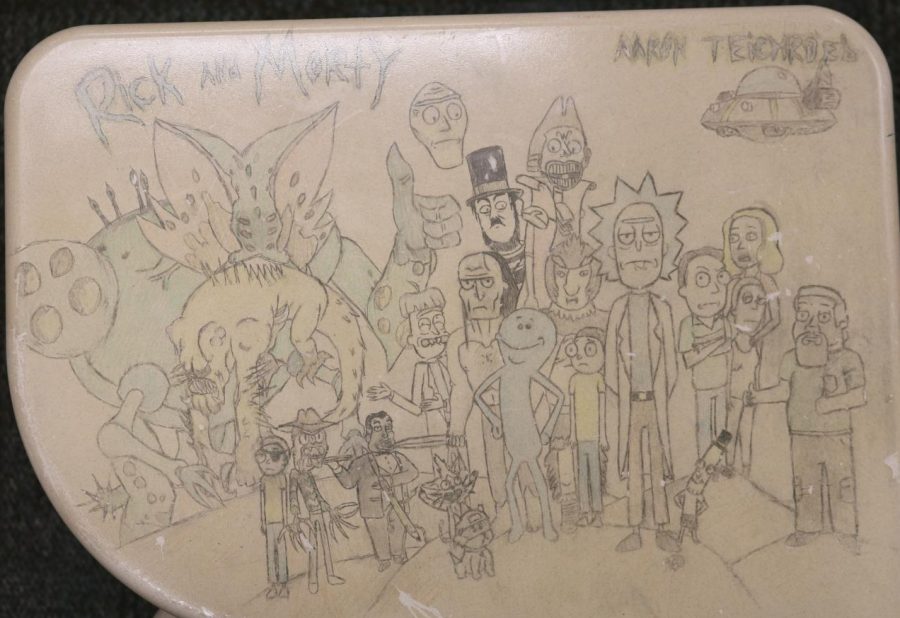
Student art displayed in Mr. Brownfield’s classroom.
JF: Where does your humor come from? Has it developed over time, or derived from other people?
SB: I have probably gotten much darker in humor over the years. It might not be for everybody; I don’t know that everybody thinks I’m hilarious. Some students probably don’t like it. Dark humor is like justice, not everybody gets it. It’s changed over the years as I’ve gotten older; it’s gotten more cynical.
JF: Who is your favorite superhero out of them all? Any reason why?
SB: Spider Man because Spider Man was my first comic. When I was 10 or 11, there weren’t as many comics. When I was a kid, Marvel probably put out 8 to 10 titles a month, DC probably put out 8 to 10.
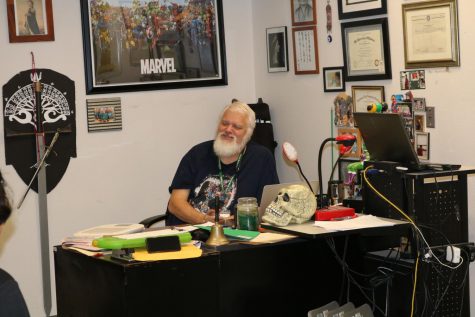
Mr. Brownfield explains the world of “Marvel”
I got Spider Man because my neighborhood grocery store. It was in their newsstand every month. You can’t buy comics at newsstands anymore, but that comic was in the newsstand every month. It was The Amazing Spider Man, and then Peter Parker: The Spectacular Spider Man. So there were those two. I don’t know why, he was not Superman and Batman, he was more normal. He wasn’t a billionaire playboy, and he wasn’t a super alien from outer space with no problems. He was a normal kid with all kinds of problems. He had all kinds of normal kid worries, hang ups, fears, and then of course, will Mary Jane go to the prom with me. Also, oh my God! Doc is trying to kill me. That’s why I really liked him when I was a kid.
JF: What are your thoughts on the new era of spider-man compared to the last two trilogies?
SB: Tobey Maguire, was a great Peter Parker. Andrew Garfield was a great Spider Man. I think Tom Holland, does both of them well. Tobey Maguire was a great Peter Parker because he got the whole nerdy, not confident, sort of insecure normal kid. Andrew Garfield, when you look at when he turns into Spider Man, they really are two different people. Tom Holland understands both of those. And he’s also more believable as a teenager.
Tom Holland is better at both things together, but I don’t know as far as the storylines go. My thing is, they’ve been too reliant [to] Tony Stark. Everything else in the Marvel Universe goes through Tony Stark, and it’s a good thing he’s dead. The Marvel Cinematic Universe needs to stand on its own two legs for change. Instead of being, you know, the universe of Tony Stark.
They need to work through not having Tony Stark. So the only choice is either Spider Man, or Dr. Strange. Dr. Strange, in some ways is better, better equipped as a character to be that centerpiece. The central narrative thing, because he’s a major cosmic character. Spider Man is still the flagship character of the company. Spider Man is still Marvel’s Superman.
JF: I’ve heard from many of your students that you are considered very progressive. Would you consider that to be true, and what do you strive for to become better at everyday?
SB: I don’t think I’m very progressive, I’m not an ideologue. I don’t believe in ideology, so I’m a pragmatist. I’m an empiricist, what is empirically true and what can be proven. I only care about what empirically works, what has been shown to work. If that happens to mean that progressive policies actually work, well that’s just too bad. I do believe in equity for all students, and it’s a shame that equity and tolerance are seen as liberalism. I do believe in equity, tolerance, acceptance of other people, diverse ideas and diverse people because that’s what works best.
JF: After many years of teaching, are you still learning information from other teachers?
SB: Every single day.
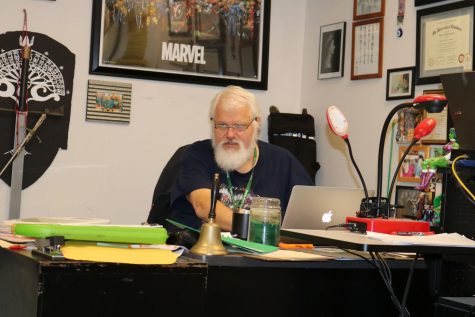
I do believe in equity, tolerance, acceptance of other people, diverse ideas and diverse people because that’s what works best.
JF: What would you say is the most interesting thing you implement into your day to day or into lectures to keep students engaged?
SB: Energy. If you’re energetic and you’re excited, then students will be more excited.
JF: How many students do you have per class period?
SB: Average about 28.
JF: Do you think the number of students being higher than years past affects the students ability to learn and/or connect with the teacher?
SB: Yeah! Because it affects what you can do in the class. You can’t do a lot of project based learning, if there’s, you know, 160 kids in your class.
JF: Is there anything you would change about your curriculum to make it better?
SB: I’ve often thought, in classical literature, that I wish it were two separate semesters. It’s a semester course, maybe they’re like classical mythology and the classical literature, or Greek classical literature and Greek classical mythology [as two classes].
JF: What would you like to see for the future of education as a whole?
SB: This is a great school. When people talk about problems in public education, they’re not talking about this place. The narrative of public education has been formed by cynical politicians that are trying to manipulate voters.
JF: Mr. Brownfield is very passionate about his job and isn’t afraid to show his humor, at all. Mr. Brownfield is devoted to keeping his students engaged in their work, while also having some fun during his lectures.

The Howl
Northward Bound


